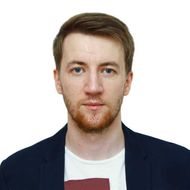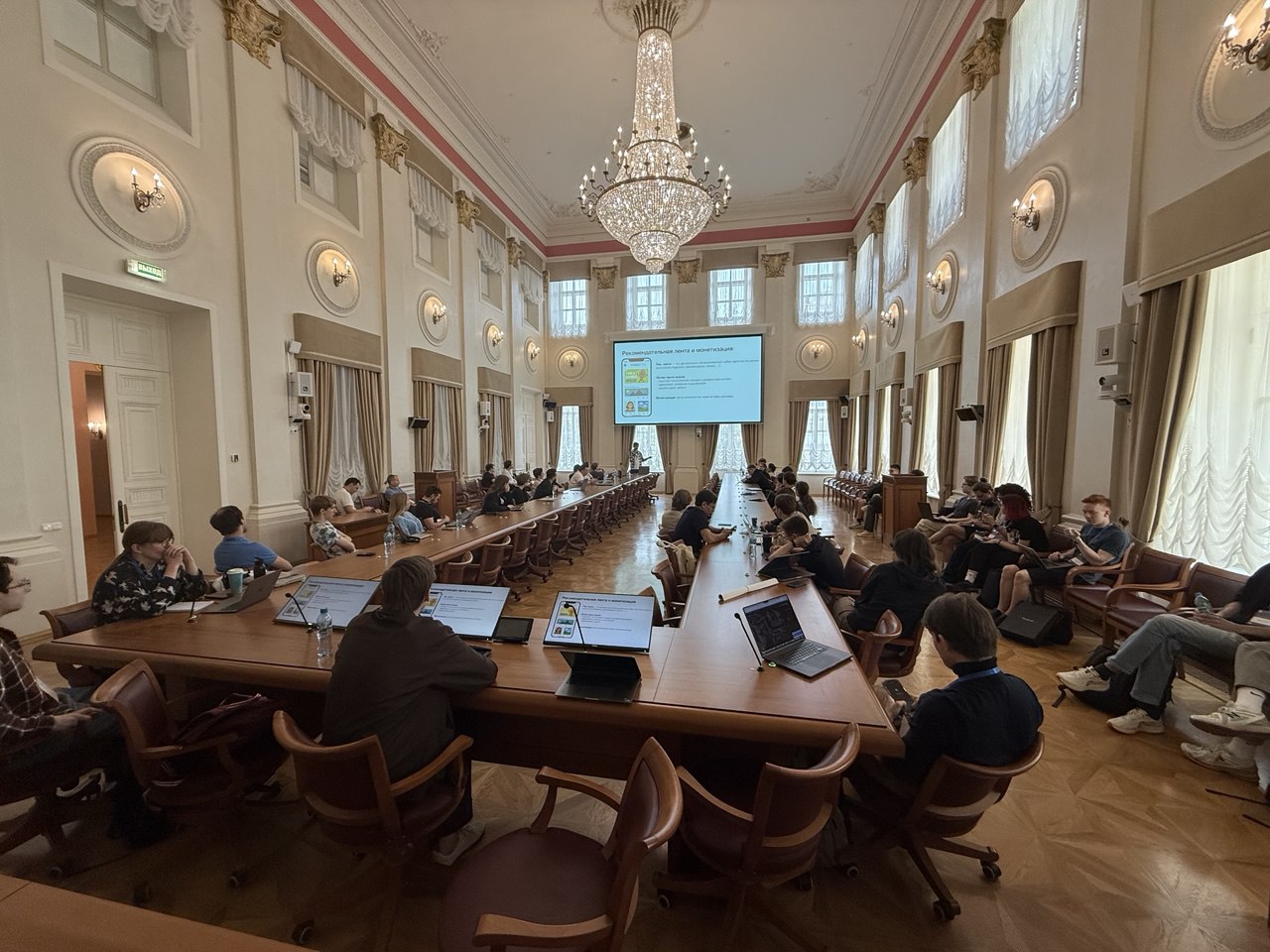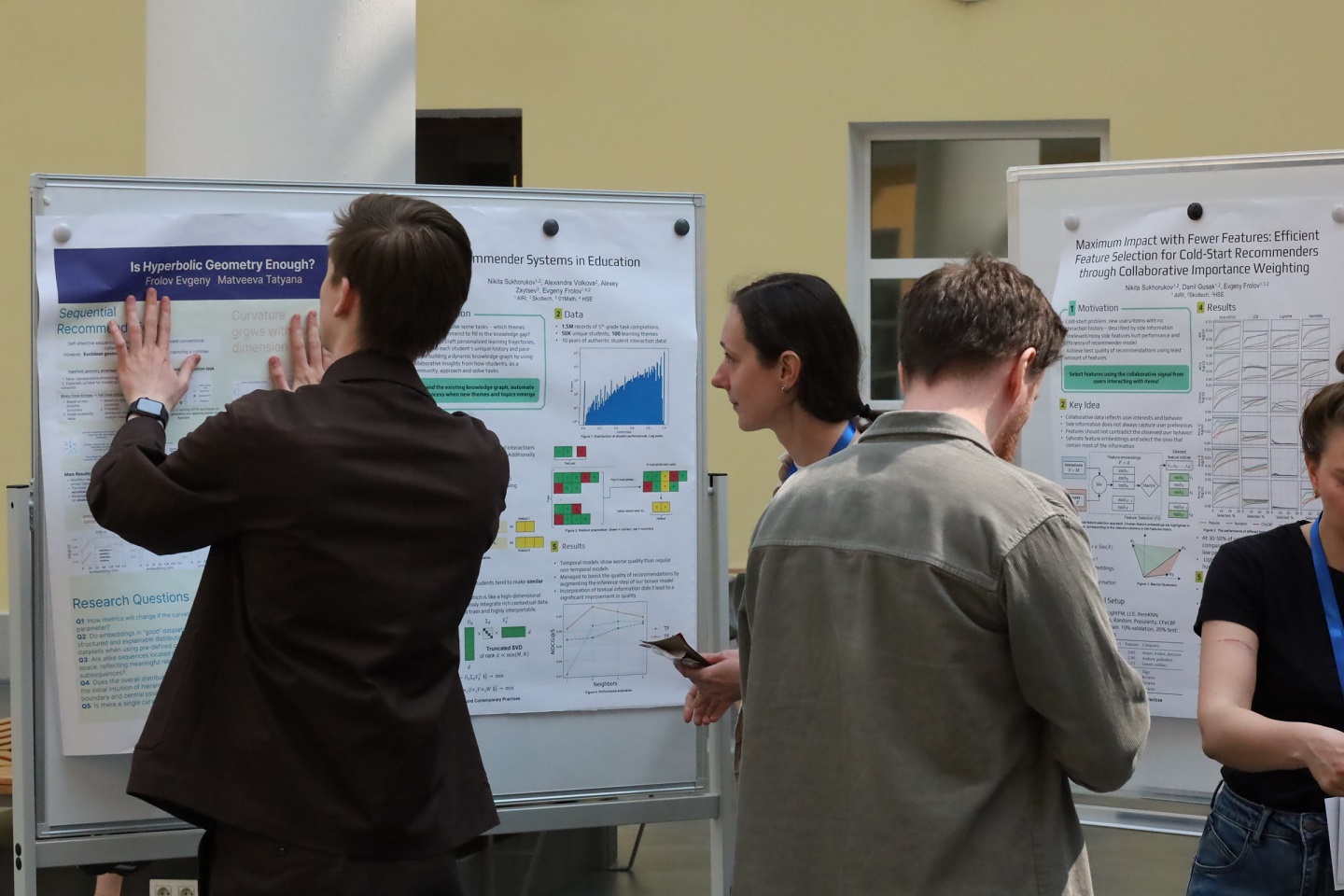Recommender Systems: New Algorithms and Current Practices

The AI and Digital Science Institute at the HSE Faculty of Computer Science hosted a conference focused on cutting-edge recommender system technologies. In an atmosphere of active knowledge sharing among leading industry experts, participants were introduced to the latest advancements and practical solutions in recommender model development.
The conference brought together experts in the development of recommender systems—a promising technology with applications in both academia and industry. The conference was organised by the Laboratory for Matrix and Tensor Methods in Machine Learning headed by Maxim Rakhuba.

Evgeniy Frolov
According to Evgeniy Frolov, Senior Research Fellow at the laboratory and Head of the Personalisation Technologies Group at AIRI, 'The second iteration of the Recommender Systems Conference brought together a community of industry and academic experts, highlighting both a strong technological foundation and a growing interest in the field. The conference programme covered a wide range of topics, from recent research submitted to RecSys 2025—the leading conference on recommender systems—to in-depth reviews of production architectures used by major companies. A notable highlight was the roundtable discussion on how well-tuned single-stage solutions could serve as a stepping stone toward a unified, LLM-oriented recommender paradigm. From my perspective, the main outcome of the conference is the emergence of a community of industry and academic experts that enables honest hypothesis testing on real-world data and provides immediate insight into its value for both business and science.'

At a training seminar held during the conference, AI researchers Gleb Mezentsev and Danil Gusak provided a detailed overview of modern approaches to building scalable and consistent recommender systems. Participants explored the latest approaches to building efficient data pipelines for processing large amounts of data, as well as the complexities of integrating recommender solutions into real-world business processes.
Sergey Ermilov, Senior Developer at VK AI, presented research findings on the impact of advertising integrations on recommender service effectiveness and outlined successful strategies for content relevance and advertising returns.
Ruslan Israfilov, Sber RecSys Team Leader, delivered a presentation titled 'The Next Step in AI Evolution: LLM-based Multi-Agent Systems,' highlighting the benefits of integrating multiple intelligent agents to improve recommendation accuracy and better understand user behaviour.

Marina Ananyeva
Marina Ananyeva, Head of RecSys at the Laboratory for Matrix and Tensor Methods in Machine Learning, discussed the shift from traditional batch learning methods to online recommender models. She presented practical cases illustrating the transition to online learning, underscoring how models adapt more quickly to changes in audience preferences.
Alexey Vasilev, Executive Director of Data Science at the Sber AI Lab, emphasised the critical role of proper data preparation in developing high-quality recommender systems. His presentation covered topics such as model architecture selection, training process optimisation, and algorithm result interpretation. 'The conference was attended by experts from leading Russian companies. I know many of the speakers personally, so it was a pleasure to reconnect,' says Alexey Vasilev. 'The excellent variety of presentations—from both industry and academia—along with the poster session, made the event truly interesting. It was great to see the discussions continue during the breaks, once again confirming that recommender systems are a highly relevant and in-demand topic. I believe the conference was a success.'
In his presentation, Evgeniy Frolov proposed an innovative approach to enhancing recommender system performance by dynamically adjusting the structure of internal data representations—a method that can significantly improve recommendation quality and reduce the likelihood of errors. 'At the conference, I presented our new paper introducing a self-supervised approach to training recommender models. We adapted the Barlow Twins method, originally developed in the field of computer vision, for transformer-based recommender architectures. In particular, beyond improving prediction quality, we were the first to identify the effect of adaptive collapse in representations: depending on the structure of user preferences, the algorithm automatically adjusts the diversity of its outputs. In datasets without clear clusters of user tastes, it generates a broad range of recommendations, while in scenarios with strictly defined, specific preferences, it focuses on the most relevant products—delivering more accurate choices compared to existing methods,' explains Frolov.

The conference concluded with a poster session in the atrium of HSE University's building on Pokrovsky Bulvar, where participants discussed the presented research in an informal setting and exchanged ideas on emerging directions in recommender technology development.
This was the second Conference on Recommender Systems hosted by HSE University, and it is becoming a key platform for discussing scientific breakthroughs and technological innovations in AI and the digital economy. The event contributes to the advancement of the recommender systems industry and the emergence of a new generation of professionals in the field.
See also:
HSE Scientists Optimise Training of Generative Flow Networks
Researchers at the HSE Faculty of Computer Science have optimised the training method for generative flow neural networks to handle unstructured tasks, which could make the search for new drugs more efficient. The results of their work were presented at ICLR 2025, one of the world’s leading conferences on machine learning. The paper is available at Arxiv.org.
Physicists Propose New Mechanism to Enhance Superconductivity with 'Quantum Glue'
A team of researchers, including scientists from HSE MIEM, has demonstrated that defects in a material can enhance, rather than hinder, superconductivity. This occurs through interaction between defective and cleaner regions, which creates a 'quantum glue'—a uniform component that binds distinct superconducting regions into a single network. Calculations confirm that this mechanism could aid in developing superconductors that operate at higher temperatures. The study has been published in Communications Physics.
Neural Network Trained to Predict Crises in Russian Stock Market
Economists from HSE University have developed a neural network model that can predict the onset of a short-term stock market crisis with over 83% accuracy, one day in advance. The model performs well even on complex, imbalanced data and incorporates not only economic indicators but also investor sentiment. The paper by Tamara Teplova, Maksim Fayzulin, and Aleksei Kurkin from the Centre for Financial Research and Data Analytics at the HSE Faculty of Economic Sciences has been published in Socio-Economic Planning Sciences.
Larger Groups of Students Use AI More Effectively in Learning
Researchers at the Institute of Education and the Faculty of Economic Sciences at HSE University have studied what factors determine the success of student group projects when they are completed with the help of artificial intelligence (AI). Their findings suggest that, in addition to the knowledge level of the team members, the size of the group also plays a significant role—the larger it is, the more efficient the process becomes. The study was published in Innovations in Education and Teaching International.
New Models for Studying Diseases: From Petri Dishes to Organs-on-a-Chip
Biologists from HSE University, in collaboration with researchers from the Kulakov National Medical Research Centre for Obstetrics, Gynecology, and Perinatology, have used advanced microfluidic technologies to study preeclampsia—one of the most dangerous pregnancy complications, posing serious risks to the life and health of both mother and child. In a paper published in BioChip Journal, the researchers review modern cellular models—including advanced placenta-on-a-chip technologies—that offer deeper insights into the mechanisms of the disorder and support the development of effective treatments.
Advancing Personalised Therapy for More Effective Cancer Treatment
Researchers from the International Laboratory of Microphysiological Systems at HSE University's Faculty of Biology and Biotechnology are developing methods to reduce tumour cell resistance to drugs and to create more effective, personalised cancer treatments. In this interview with the HSE News Service, Diana Maltseva, Head of the Laboratory, talks about their work.
Solvent Instead of Toxic Reagents: Chemists Develop Environmentally Friendly Method for Synthesising Aniline Derivatives
An international team of researchers, including chemists from HSE University and the A.N. Nesmeyanov Institute of Organoelement Compounds of the Russian Academy of Sciences (INEOS RAS), has developed a new method for synthesising aniline derivatives—compounds widely used in the production of medicines, dyes, and electronic materials. Instead of relying on toxic and expensive reagents, they proposed using tetrahydrofuran, which can be derived from renewable raw materials. The reaction was carried out in the presence of readily available cobalt salts and syngas. This approach reduces hazardous waste and simplifies the production process, making it more environmentally friendly. The study has been published in ChemSusChem.
Master’s Students of HSE, University of Campinas, and Tsinghua University Publish Joint Student Research Collection
Master’s students of the HSE ISSEK programme ‘Science, Technology and Innovation Management and Policy’ have released a joint research collection with the University of Campinas (Brazil) and Tsinghua University (China) titled ‘Being Innovative or Being on the Safe Side—Managing the Risk of Failure.’ The authors explore how organisations perceive risks and embrace innovation within different cultural contexts.
‘A Turn Away from Stereotypes’: Moscow Hosts ‘Researching the Deaf Community’ Conference
On October 17–19, 2025, the third annual interdisciplinary conference ‘Researching the Deaf Community 2025: on the Periphery of Attention’ took place at GES-2 House of Culture in Moscow. The event was organised with the participation of the HSE International Laboratory for Social Integration Research. HSE University Vice Rector Irina Martusevich addressed attendees at the opening ceremony.
Exploring the Mind: HSE Scientists Discuss Cognitive Technologies of the Future
Why we make irrational decisions, how the brain responds to fakes, and whether neural networks are capable of thinking—these were the topics discussed by early-career scientists of HSE University during the NAUKA 0+ science festival. The event brought together students and experts from various fields, united by a common goal—to deepen their understanding of the human brain and cognitive technologies.


